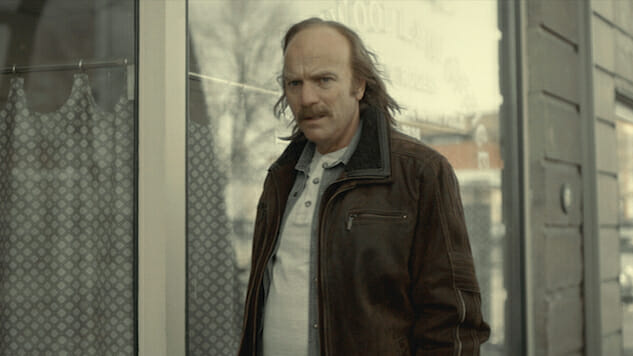Fargo: Wrong Place(s), Wrong Time(s)
(Episode 3.02)
FX
Last week, the season premiere of Fargo opened with a cryptic scene, set in East Berlin in 1988: A man, under intense questioning by a Stasi officer who accuses him of murdering his girlfriend, insists that the office has mistaken him for somebody else. As urine runs down the man’s leg and through the drain in the floor, fear fully taking over, the camera pans to a picture that transports us to the winter landscape of Minnesota in 1988. Fargo loves to play with the notion of time and human connection, but the abstractness of that opening was a real head-scratcher.
“The Principle of Restricted Choice” doesn’t exactly clear everything up, but it does build upon the premiere’s exploration of how chaos can bring about truth. Take the murder of Ennis Stussy (Scott Hylands), for instance. Like the man in the premiere’s cold open, he’s a victim of mistaken identity. Where the promise of violence that comes from the Stasi officer is the result of an oppressive regime, the violence that comes knocking at Ennis’ door is more haphazard, the unfortunate result of a bumbling stoner escalating a simple robbery into something much more vicious. The reasons for those moments of violence may not be connected, but the victims are. They are men in the wrong place at the wrong time, with names that don’t match who they really are.
The man in East Berlin is not accused murdered Yuri Gorka, and Ennis Stussy isn’t, well, Ennis Stussy. Rather, he’s Thaddeus Mobley, a once-important sci-fi writer who, a newspaper clipping tells us, once won a Golden Planet award for one of his books. In the premiere, Gloria’s (Carrie Coon) sweep of the house revealed an award that looked a lot like a Hugo, and now the pieces are falling into place. Why did Thaddeus Mobley change his name, and why did he come to Minnesota? With Fargo, you’re never really sure if those questions matter in the grand scheme of things, or if they’re important to the murder investigation and the ongoing feud between the Stussy brothers (no relation to Ennis). But those questions do provide depth to this world.
-

-

-

-

-

-

-

-

-

-

-

-

-

-

-

-

-

-

-

-

-

-

-

-

-

-

-

-

-

-

-

-

-

-

-

-

-

-

-

-








































